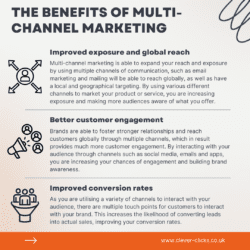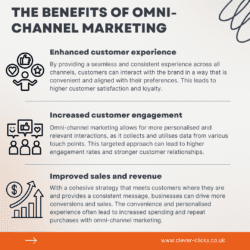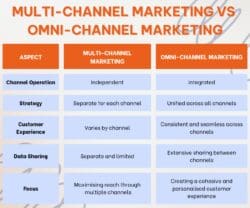Multi-channel vs omni-channel marketing – what’s the difference?





By Sam Read
Digital Marketing Executive
Sam has 6 years of digital marketing experience, starting as an apprentice and building on his Fashion Marketing degree. He specialises in SEO, content, and design.
7 June 2024
Blog Digital Strategy Email Marketing Social MediaThere are several ways for businesses to connect with their customers in the ever-changing world of marketing. It’s critical to understand the distinctions between omni-channel and multi-channel marketing to select the best approach for achieving your company’s objectives. Whilst both strategies use a variety of marketing platforms to engage consumers, there are notable differences in execution and focus.
Whether you’re a business owner, marketing professional, or simply exploring ways to better engage your customers, understanding the difference between multi-channel and omni-channel marketing is key to building an effective strategy. In this article, we’ll break down the core differences, highlight the benefits of each approach, and help you decide which method aligns best with your business goals and customer expectations. So dive into our blog to find out what each type is, their differences and how they can benefit you with the insight written by digital marketing experts!
Multi-channel marketing is the use of various marketing channels to promote a product or service. These channels could include email marketing, social media marketing, utilising an app or website, paid media such as ads, having a physical store or mailing. By using different channels, you are able to expand your reach and make it easier for customers and prospects to find the product or service you are promoting.

With “omni” meaning “all”, and “channel” referring to the various ways a business connects with consumers, omni-channel marketing is the use of these channels to connect with customers effectively and seamlessly. These channels can include online browsing, social media engagement, email marketing, physical stores, app development, SMS marketing and more which should allow customers to move between them with ease. This allows the customer to gain a cohesive and seamless experience when interacting with a brand, through various channels that work together, rather than separate, independent channels. Only 14% of businesses say they are currently running coordinated marketing campaigns across all channels (Zoominfo), which is proof that brands are falling behind on the benefits of omni-channel marketing.

Multi-channel marketing and omni-channel marketing are very similar but also have some key differences. The most notable difference between the two types of marketing is their channel operation, with multi-channel being independent, having each of their channels stand on their own and the customer experience varies by channel. Whereas omni-channel marketing channels are integrated, they all merge and work as one by being cohesive and flowing from one channel to another, which allows customers to have a unified experience with whichever channel they interact with.
In terms of data, multi-channel marketing keeps channel data separately, reviewing performance for each individual channel. Omni-channel marketing however allows for extensive data sharing between the unified channels, which can allow businesses to get a deeper understanding of analytics and data. The focus for multi-channel marketing is to maximise the reach through multiple separate channels, and for omni-channel marketing, it is to create a cohesive and personalised customer experience.

For example, by combining online, app, and in-store experiences, a fashion company may profit from omni-channel marketing. This would enable customers to reserve goods, check store inventory online, and earn loyalty points across all platforms. However, a software business that uses email campaigns, webinars, and PPC ads to target various groups may choose to use a multi-channel strategy to tailor messaging for each platform.
Multi-channel marketing utilises a linear approach where the customer journey is separately tracked for each independent channel. This creates a series of independent steps for each channel which is seen as a sequence of separate interactions. This approach gathers individual metrics to measure success for each separate channel, causing the data to be isolated and stored separately, which can make it harder to get a full view of the customer’s journey.
Omni-channel marketing uses a holistic approach to create a seamless journey allowing for an integrated experience across all channels. These integrated steps allow customers to switch between channels easily, as their journey is a continuous experience. Doing this, allows for unified metrics as the success is measured across the channels together, providing centralised data which can be combined from all the channels to give a full view of the customer’s journey. Having a consistent journey ensures that customers get a smooth and consistent experience across all channels.
When you choose which strategy to use for your business, you need to keep in mind what your business goals are, what your customers need and expect, and what resources you have available. Depending on your business type, you may have different demographics of users who typically visit the website from different channels. If that’s the case, a multi-channel approach allows you to tailor your message more strategically towards your varying audiences.
Omni-channel marketing is the perfect fit for businesses that want to provide a consistent and seamless experience for customers across all of their channels. Omni-channel marketing can lead to an enhanced experience which improves customer loyalty, and it provides your business with a unified voice to give your audience a cohesive experience.
The decision between omni-channel and multi-channel marketing is based on your company’s objectives, available resources, and your customer’s expectations. While multi-channel marketing has greater testing abilities and more targeted messaging, it can break up the feeling of a unified tone of voice for your brand.
Omni-channel marketing usually increases consumer loyalty by integrating all channels to create a seamless, consistent experience. Determine which plan best supports your growth and customer engagement objectives by assessing your business’s needs and capabilities.

Discover the latest trends in paid media and how they're reshaping digital advertising strategies. Stay ahead with insights into platform updates, targeting innovations, and performance optimisation.
Read full blog
Learn how to boost sales on Instagram without spending on ads. Discover proven organic strategies to grow your audience, increase engagement, and drive conversions.
Read full blog